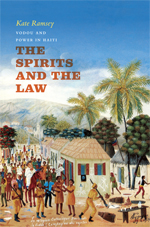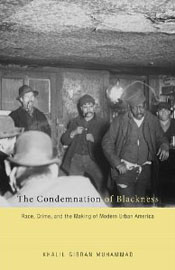CAAS Hosts First Book Series Featuring Scholar-Authors
The Center for African-American Studies (CAAS) is hosting a First Book series during the Fall 2011 semester. The series features trailblazing junior scholar-authors whose projects are and will make significant contributions to the field of African-American Studies.
Gina Athena Ulysse, the new director of the Center for African American Studies, associate professor of African American Studies, associate professor of anthropology, created the series as the main initiative of her directorship to coincide with the AFAM junior colloquium that she is teaching.
Ulysse’s interests and concerns were to economically achieve three goals: 1) give AFAM incoming majors the opportunity to engage directly with scholars who are impacting the field of study; 2) revive CAAS’s old tradition of excellent programming; and 3) expose the broader Wesleyan and Middletown community to works and projects that are not only adding new knowledge to African-American Studies but are doing so in original and nuanced ways. “In recent years, there have been so many developments in the field that ask us to rethink historiography, seriously engage with queer studies and unpack both the racialization and geopolitics of religions, criminality and consumer cultures within the U.S. and broader black diaspora. The projects selected to inaugurate the series specifically reflect on these intersections,” Ulysse says. “I was also adamant that the series includes a Wes alumna whom we would bring back to celebrate her achievement. We have a solid line up!”

On Oct. 4, Jafari Sinclaire Allen, assistant professor of anthropology and African-American studies at Yale University, will speak about his book, iVenceremos? The Erotics of Black Self-Making in Cuba (Duke University Press 2011). In Venceremos, Allen marshals a combination of historical, literary, and cultural analysis– most centrally, ethnographic rendering of the everyday experiences and reflections of Black Cubans to show how Black men and women strategically deploy, re-interpret, transgress and potentially transform racialized and sexualized interpellations of their identities, through “erotic self-making.” Venceremos argues that mutually constituting scenes in Havana and Santiago de Cuba– like semi-private, extra-legal parties of men who have sex with men; HIV education activism; lesbian performance and incipient organizing of women who have sex with women; hip-hop and la monia (US R&B/soul music) parties and concerts; sex labor; cigar “hustling” and informal Black consciousness raising networks– represent a gravid space for becoming new revolutionary men and women, with new racial, gender and sexual subjectivities.
On Oct. 18, Kate Ramsey, assistant professor of history at the University of Miami, will speak about her book, The Spirits and the Law: Vodou and Power in Haiti (University of Chicago Press 2011). Vodou has often served as a scapegoat for Haiti’s problems, from political upheavals to natural disasters. This tradition of scapegoating stretches back to the nation’s founding and forms part of a contest over the legitimacy of the religion, both beyond and within Haiti’s borders. The Spirits and the Law examines that vexed history, asking why, from 1835 to 1987, Haiti banned many popular ritual practices.

On Nov. 8, Khalil Gibran Mohammed, the new director of the Schomburg Center for Research in Black Culture in Harlem, N.Y., will speak on The Condemnation of Blackness: Race, Crime, and the Making of Modern Urban America (Harvard University Press 2010). In Condemnation, Mohammed writes about ways black criminality was crucial to the making of modern urban America, as were African Americans’ own ideas about race and crime. Chronicling the emergence of deeply embedded notions of black people as a dangerous race of criminals by explicit contrast to working-class whites and European immigrants, this fascinating book reveals the influence such ideas have had on urban development and social policies. Read more about Mohammed in this New York Times article.
On Nov. 29, anthropology major Oneka LaBennett ’94, assistant professor of African and African American studies at Fordham University, will speak about her book, She’s Mad Real: Popular Culture and West Indian Girls in Brooklyn (New York University Press 2011). In She’s Mad Real, LaBennett draws on more than a decade of researching teenage West Indian girls in the Flatbush and Crown Heights sections of Brooklyn to argue that Black youth are strategic consumers of popular culture and through this consumption they assert far more agency in defining race, ethnicity and gender than academic and popular discourses tend to acknowledge. Importantly, LaBennett also studies West Indian girls’ consumer and leisure culture within public spaces in order to analyze how teens like China are marginalized and policed as they attempt to carve out places for themselves within New York’s contested terrains.
For more information about the series visit the African American Studies Program web site online here.

